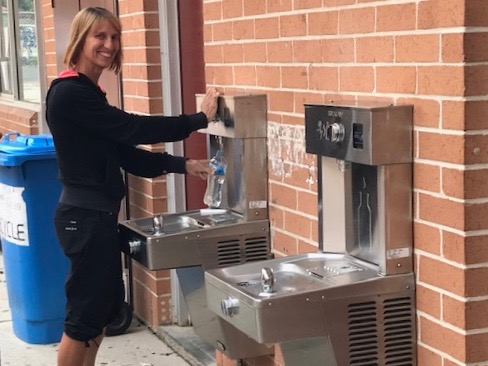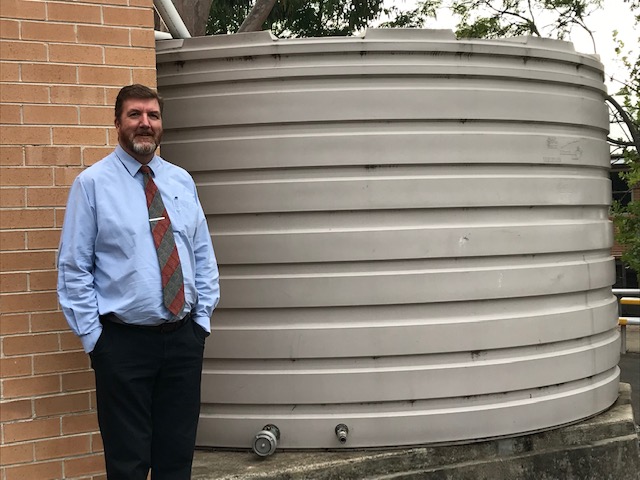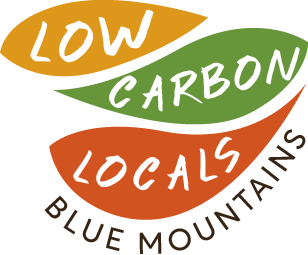Let’s get on with this!” When I first spoke with Winmalee High School’s Principal, Katrina Middlebrook, in November 2017, about the idea of joining the Low Carbon Living program, this was her enthusiastic response. The school had already undertaken several steps in the move towards sustainability and are keen to do more to reduce their carbon footprint.
Following that first, inspiring conversation, I joined Katrina and another interested staff member on a walking tour around the school. I was thrilled to find the school had already installed a 6.6 kW solar, photo-voltaic array system which generates over 9000 kWh each year and they were complementing their energy generation with the purchase of Green Power.
Additionally, a dedicated paper and cardboard recycling system was used throughout the classrooms. To reduce the amount of water being brought in single use plastic bottles by students each day, three cold filtered water stations had been installed in the school’s grounds which count the number of plastic water bottles saved for each litre of water used.

These water stations proved very popular with students and teachers alike, with a large number of students now bringing drink bottles from home which can be reused every day, saving a huge amount of plastic from going to landfill. Katrina was keen to work with LCL to further improve the school’s sustainable practices and has embedded respecting the environment as part of the school’s work with the school community.
Tackling this issue might prove challenging but as a result of collaboration with interested students and staff, and a clear goal to use more environmentally and sustainability friendly products, Winmalee High have made impressive progress. Since completing their initial carbon audit, the school community has acted on many of the recommendations, making conversations and a student voice around consumption, waste and the future of the planet an integral part of the school’s agenda. The Caffeine Lab, the Hospitality student run café at the school, has introduced biodegradable packaging when serving food and beverages for breakfast. The Canteen Manager, Lisa Hooley has also moved to environmentally friendly packaging for her food and beverages. There are still refinements occurring.

They have also taken on the war on waste to develop the student’s awareness of the volume of waste to landfill they discard. This action came from Year 10 students after watching the TV series on the War on Waste. Local Councillor, Shae Foenander, donated several yellow recycling bins which are used to collect recyclable plastics and other drink containers.
Some reverse cycle air conditioning has been introduced to support students with special needs. The air conditioning installed in the Hall is energy efficient in that it works by passing air over cooled water tanks and runs at an energy cost less than two x 1.5 Kw conventional air conditioners. With the increasing number of above average temperatures due to climate change, Katrina Middlebrook is concerned about keeping staff and students cool enough to be able to concentrate on their teaching and learning. Some classrooms have been experiencing temperatures above 38C. Reverse cycle air conditioning is the most energy efficient way to heat or cool living or working areas. However thorough roof, floor and wall insulation, as well as sealing up gaps and window shading can reduce energy consumption by up to 40%.
To offset the heat coming in Summer, Winmalee High has installed internal window blinds and shades as well has undertaken to ‘window tint’ all of the West and North Western windows to reflect heat and thereby save on the cost of air-conditioning.
A number of water tanks located around the school collect the water from roof surfaces for use across the school. Plants, including edible plants decorate some of the hard surfaces of the school to help cool these unforgiving spaces on warmer days.

Whilst some of Winmalee’s LCL carbon audit recommendations are very hard to achieve within the constraints of working within the Department of Education, such as low flow taps, duel flush toilets or LED lights, additional progress has been made. Whilst changing regular lightbulbs to LEDs saves 50-70% of the energy used for lighting and up to 600 kilograms of carbon dioxide pollution for the lifetime of the bulb, working within Department of Education maintenance constraints does not always allow for such quick fixes.
Low Carbon Living is proud of the work Winmalee High has done to reduce their waste to landfill. This is particularly satisfying due to the size of the school’s daily operations. We look forward to supporting and promoting Winmalee High’s Low Carbon Living operational and educational successes for the environmental sustainability and for our future generations and ecosystems.
